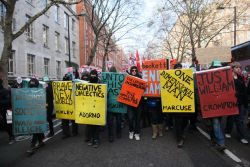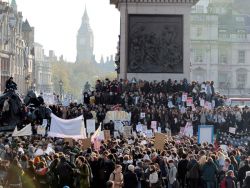Halifax Media Co-op
News from Nova Scotia's Grassroots
The Politics of Escalation: looking at the British student movement
Facing a 300% increase in  university fees, English students have been engaged in an ever deepening struggle to stop the massive cutbacks to education.
university fees, English students have been engaged in an ever deepening struggle to stop the massive cutbacks to education.
Back in 2007, the world financial system began to show signs that it was about to tank. Housing prices, the motor of wealth creation in the five previous years, began to stumble. Banks all over the world had been leveraged to the hilt with complex financial instruments that at the end of the day relied on shoddy loans which artificially pumped up housing prices. These housing prices where the very thing people were making loans against. When housing prices crashed people instantly couldn't make payments on their loans. They defaulted, banks foreclosed houses and put them up for sale which further flooded the market with a huge supply of houses which in turn depressed prices even more. The house of cards came tumbling down.
To make matters worse banks and other financial institutions had bundled mortgages and "created" things like credit default swaps and other crazy schemes to make more money. (Watch this for a nice simple explanation) The result was no one knew who held what mortgages. In America, Europe and the rest of the world, banks and large financial institutions were given huge sums of money, with no oversight. That money along with the other public spending pledges that happened in 2008 and 2009 created massive deficits and added to the public debt. Some of those same institutions, such as Goldmann Sachs then turned around and attacked smaller countries over their supposed debt crisis.
In Britain, the government very publicly bailed out the banks and in a way nationalized them and mortgage lenders, if only for a shot period. The government deficit in relation to GDP became a problem for the markets and when the Conservative-Liberal Coalition (ConDem gov't) came to power they outlined a plan to drastically cut government spending. What ensued was one of the most massive, brazen, and cruel transfers of wealth. The ConDem's unloaded the cost of the bailout on the backs of the poor, workers, pensioners, artists and students.
 All across Europe governments are busy slashing budgets and social programs to satisfy the markets which 18 months earlier received massive injections of capital from those very same governments. People across Europe were being robbed and held hostage by the market. In France, students and workers undertook large scale protests, same in Ireland, Greece, Spain, Portugal, Romania, Iceland and most other countries in Europe. These massive protests and mini-rebellions against this all too obvious economic assault are the back drop to the current situation in Britain.
All across Europe governments are busy slashing budgets and social programs to satisfy the markets which 18 months earlier received massive injections of capital from those very same governments. People across Europe were being robbed and held hostage by the market. In France, students and workers undertook large scale protests, same in Ireland, Greece, Spain, Portugal, Romania, Iceland and most other countries in Europe. These massive protests and mini-rebellions against this all too obvious economic assault are the back drop to the current situation in Britain.
When the Coalition government formed, the Lib-Dems were able to garner enough support from students to be able to be a coalition partner. The reason the Lib-Dems cornered the student vote was that it made a very explicit promise to not raise fees on students attending university.
 This promise was broken almost immediately. Students were pissed off and those who had held out hope for the Lib-Dems were quickly
This promise was broken almost immediately. Students were pissed off and those who had held out hope for the Lib-Dems were quickly
disappointed. Students were left with no other recourse than to hit the streets. There was no other party to have faith in, Labour introduced fees in the first place, and the Tories never had any pretense about caring for affordable education. The National Union of Students (NUS), the umbrella student organization for all of Britain, organized a massive student day of action on November 1oth through the coalition of National Campaign Against Fees and Cuts (which includes students and university workers).
 The action November 1oth was huge and widespread across Britain. In London the most dramatic of the day's actions happened. A group of protesters stopped at Millbank tower, the Tory campaign headquarters, which was along the march route, beat back riot police and smashed their way inside. Protesters went on the roof and threw paper and hung banners to large applause of the thousands of students on the streets below. Students were later kettled down below, enraging thousands.
The action November 1oth was huge and widespread across Britain. In London the most dramatic of the day's actions happened. A group of protesters stopped at Millbank tower, the Tory campaign headquarters, which was along the march route, beat back riot police and smashed their way inside. Protesters went on the roof and threw paper and hung banners to large applause of the thousands of students on the streets below. Students were later kettled down below, enraging thousands.
 The NUS president Aaron Potter immediately condemned the Millbank occupation as the result of violent troublemakers. The mainstream press and politicians also piled on scorn for the brutish behaviour of anarchic elements.
The NUS president Aaron Potter immediately condemned the Millbank occupation as the result of violent troublemakers. The mainstream press and politicians also piled on scorn for the brutish behaviour of anarchic elements.
However, even within the NUS executive there were those who supported the Millbank Tower occupation. Not because they supported fringe elements but because the students themselves had engaged and supported the action. To attribute the occupation to fringe elements, such as anarchists, totally misrepresents the situation. Anarchist elements within the protest movement are sporadic and small. Most people who occupied the Tower were first time protesters. They were not, as many North American anarchists and mainstream media pundits believe, anarchists pushing the struggle forward. They were newly politicized. Some may have been anarchists (I hope) but the majority weren't.
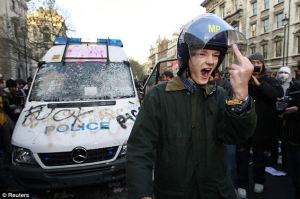 The division within the NUS came to head during the major day of protest on November 24th. Students and supporters marched on Whitehall. They were kettled and some students destroyed a police van. Many felt that the van was deliberately left there to distract and divide the protesters. For anyone who was in Toronto during the G20 this was also a matter of much debate. Know one actually knows if that was the case but there were moments of contention around the van. Possibly it was a tactical mistake to concentrate on the van. However, what was most interesting about the day was that direct action, violence and property destruction were widespread. They had popular support among the students and weren't committed by a small sect of radicals. The voices within the NUS which were critical of "violence" during the Millbank Tower occupation, were muted and sidelined within the student movement.
The division within the NUS came to head during the major day of protest on November 24th. Students and supporters marched on Whitehall. They were kettled and some students destroyed a police van. Many felt that the van was deliberately left there to distract and divide the protesters. For anyone who was in Toronto during the G20 this was also a matter of much debate. Know one actually knows if that was the case but there were moments of contention around the van. Possibly it was a tactical mistake to concentrate on the van. However, what was most interesting about the day was that direct action, violence and property destruction were widespread. They had popular support among the students and weren't committed by a small sect of radicals. The voices within the NUS which were critical of "violence" during the Millbank Tower occupation, were muted and sidelined within the student movement.
Student occupation of buildings at colleges and universities began on November 23rd. These occupations were not a nationally coordinated event. They started in one place (Royal Holloway College) and spread over the next two weeks to dozens of universities across the country ( most of the occupations have been temporary). Some of the occupations resulted from marches and demos, where students decided that if administrators and politicians weren't going to listen they were going to occupy.
 On November 3oth another demo in London occurred. Kettling and police violence was on full display. Students were angry, not just at the government but at the police and media. Elsewhere across the country similar large protests occurred with the same amounts of violence and resistance. On the same day students in Italy also protested and occupied buildings across the country.
On November 3oth another demo in London occurred. Kettling and police violence was on full display. Students were angry, not just at the government but at the police and media. Elsewhere across the country similar large protests occurred with the same amounts of violence and resistance. On the same day students in Italy also protested and occupied buildings across the country.
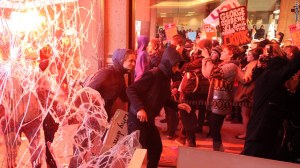 Then on December 9th as the ConDem government voted for the fee increase protesters came out in force across the country. In London demos turned violent, Prince Charles car was attacked (along with Camilla), the Treasury building was smashed, and protesters and riot police had a running battle in the streets, not seen since the poll tax riots.
Then on December 9th as the ConDem government voted for the fee increase protesters came out in force across the country. In London demos turned violent, Prince Charles car was attacked (along with Camilla), the Treasury building was smashed, and protesters and riot police had a running battle in the streets, not seen since the poll tax riots.
 The future of the student movement in Britain is up in the air. What will happen next? Will students propel the struggle forward on the streets or change tactics? What will be the strategy now? Will new alliances form on the left? Will other workers and pensioners start to join forces with students to fight austerity?
The future of the student movement in Britain is up in the air. What will happen next? Will students propel the struggle forward on the streets or change tactics? What will be the strategy now? Will new alliances form on the left? Will other workers and pensioners start to join forces with students to fight austerity?
 What lessons can we begin to tease out of the British situation? I think the first thing to do is debunk the myth that those pushing this struggle into a more radical space are themselves "radicals." At the forefront of the British student movement are students who are recently politicized by the situation. Their radical actions are the result of the failure of traditional politics (electoral) to solve the current situation. Students are developing radical politics through practice.
What lessons can we begin to tease out of the British situation? I think the first thing to do is debunk the myth that those pushing this struggle into a more radical space are themselves "radicals." At the forefront of the British student movement are students who are recently politicized by the situation. Their radical actions are the result of the failure of traditional politics (electoral) to solve the current situation. Students are developing radical politics through practice.
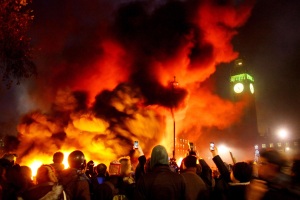 Imagine 6 months ago. Would anyone have believed that British students would be rioting on mass, occupying universities and that student leaders would be calling for a new 68? No, obviously not. If people would have proposed to have large demos, occupations and violent direct action 6 months ago would that have been possible, would that have had mass support? No. Some would have supported it, but most students would not have understood. The myth of electoral change was still too strong. However through the process of escalation students, on mass, were able to arrive at a place where there was popular support for direct confrontation.
Imagine 6 months ago. Would anyone have believed that British students would be rioting on mass, occupying universities and that student leaders would be calling for a new 68? No, obviously not. If people would have proposed to have large demos, occupations and violent direct action 6 months ago would that have been possible, would that have had mass support? No. Some would have supported it, but most students would not have understood. The myth of electoral change was still too strong. However through the process of escalation students, on mass, were able to arrive at a place where there was popular support for direct confrontation.
 Students are being radicalized, not by the proclamations of revolutionaries, but by the hard work of those organizing and creating a movement which make radicalization a possibility. Direct action and violence are now legitimized within the British student movement not because some people engaged in those actions, or because some declared it. Instead it is because students themselves organized in a manner which allowed other students to see that direct action was necessary. The escalation of the student movement from petitioning, to protesting, to occupying, to fighting allowed students to develop a collective power and collective analysis with unknown possibilities.
Students are being radicalized, not by the proclamations of revolutionaries, but by the hard work of those organizing and creating a movement which make radicalization a possibility. Direct action and violence are now legitimized within the British student movement not because some people engaged in those actions, or because some declared it. Instead it is because students themselves organized in a manner which allowed other students to see that direct action was necessary. The escalation of the student movement from petitioning, to protesting, to occupying, to fighting allowed students to develop a collective power and collective analysis with unknown possibilities.
 I am not saying radicals, anarchists and others aren't playing a positive role, but what is exciting is not the anarchists doing things. What is exciting are the students, who were not at all radicalized a couple of months ago, are now growing more systematic critiques of capitalism and parliamentary democracy. As one student recently told the BBC ""I hate they way the government and press try and blame it on a small minority, everyone here is angry - it's not a small group of hardcore anarchists, it's just students who are very, very angry." The hope in this situation lies in that very anger being transformed into organized resistance to this economic assault.
I am not saying radicals, anarchists and others aren't playing a positive role, but what is exciting is not the anarchists doing things. What is exciting are the students, who were not at all radicalized a couple of months ago, are now growing more systematic critiques of capitalism and parliamentary democracy. As one student recently told the BBC ""I hate they way the government and press try and blame it on a small minority, everyone here is angry - it's not a small group of hardcore anarchists, it's just students who are very, very angry." The hope in this situation lies in that very anger being transformed into organized resistance to this economic assault.
Originally posted on my blog: www.hammerhearts.wordpress.com
Please look at these links for some more info:
Coalition of Resistance conference | School Student | 27 Nov 2010
This isn't just a student protest. It's a children's crusade
Student protests: today is our 68 moment
December 9th day of action against cuts and fees
UfSO First Conference: On Violence
Student protesters announce more marches and walkouts over tuition fees
Graffiti Riot: Paint bombs fly at cops as students rage in London
And please watch this video about the poll tax riot, it is very relevant to the current situation in Britain.
The site for the Halifax local of The Media Co-op has been archived and will no longer be updated. Please visit the main Media Co-op website to learn more about the organization.
